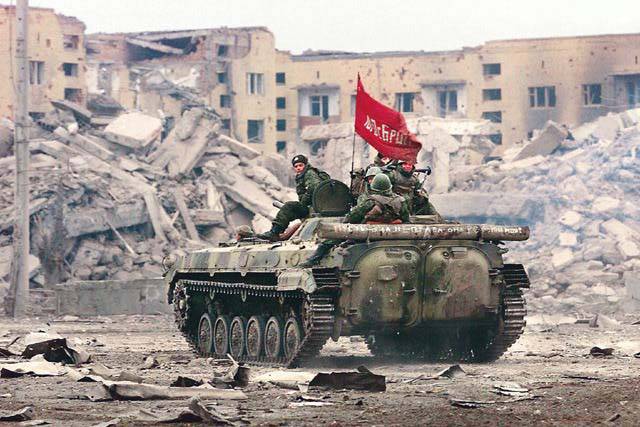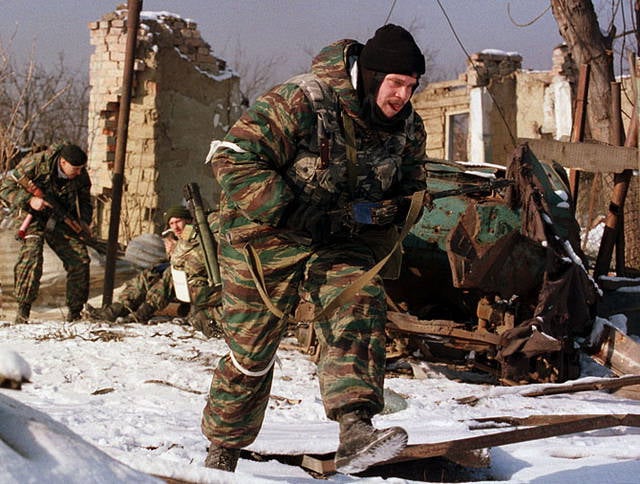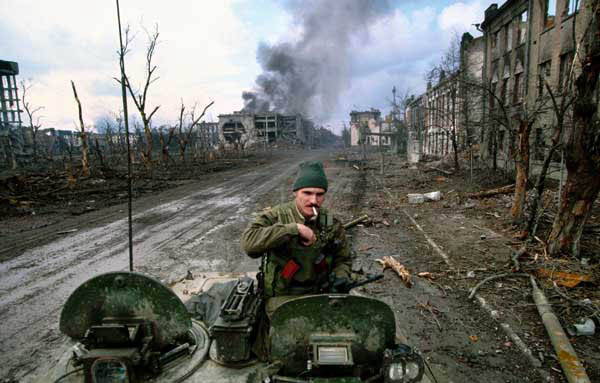Storm of the Terrible, 1999 year
Unlike the events of the end of 1994, when it was originally planned to take Grozny, this time the military to the last doubted the need for an assault. The views on the need for an assault were shared by the Chief of the General Staff, Army General Anatoly Kvashnin, and the commander of the joint group of troops, Viktor Kazantsev. In their opinion, after clearing the flat part of Chechnya, reaching the mountains, the troops left behind a kind of fortified area, which was packed with well-armed and equipped armed gangs, well trained, headed by the most odious Chechen commanders. Destroying them in the city was a difficult task, but it was necessary to continue the success of the entire counter-terrorist operation in Chechnya.
Also, the generals did not disregard such an aspect as the use by militants for their propaganda purposes of the assertion about the inaccessibility of the city of Grozny, the capital of Ichkeria will never be taken by the Russians, the propaganda of the militants claimed. Leave in the hands of the militants such a trump the Russian command did not want. The generals understood perfectly well how negatively this could affect the army and public opinion inside the country.

Were at the storming of the capital of Chechnya and opponents. One of them was Colonel-General Vyacheslav Ovchinnikov, who at that time commanded the internal troops of the Interior Ministry. He believed that it was not possible to carry out an assault on Grozny at the end of 1999, and the general's arguments were also quite convincing. According to Vyacheslav Ovchinnikov, the units of the explosive forces involved in the counterterrorist operation are exhausted by continuous battles, “soft” and “hard” sweeps, in parts there is a large shortage of personnel (dead, wounded, sick) formed after the hostilities in Dagestan and the march across the plains of Chechnya. Most of the soldiers end their established service lives and need to be fired, and the fighters who replaced them simply will not have the experience that the “old men” have already gained.
All the time before the assault, the city was subjected to Russian attacks aviation and rocket and artillery strikes.
For example, on October 25, Russian attack aircraft made raids on the southern part of the city, and the destruction of an anti-aircraft installation and two militant vehicles was reported.
October 30 as a result of the strike of Russian aviation in the city destroyed a fuel depot and an electrical equipment workshop, in which, according to preliminary information, handicraft grenade launchers went.
October 31 Russian aviation bombed the northern regions of Grozny, 10 propaganda bombs AgitAB-500-300 were dropped on the city.
On November 5, the Russian stormtroopers managed to destroy the headquarters of the Chechen commander Ruslan Gelayev, and at the same time the mini refineries 4 were destroyed.
November 6 was hit by a tactical missile system "Tochka-U" against militants in Grozny.
8 November 1999 of the year on the positions of the militants, hiding in Grozny, Russian artillery begins to work.
In mid-December, the Russian army occupied Hankalu, an eastern suburb of Grozny, which was widely known to the public through the previous campaign. From Khankala, Russian troops opened a direct road through the streets of the Oktyabrsky district to Minutka Square, and the first residential quarters of the Chechen capital were separated from Khankala only by adjacent dacha areas. Practically the entire December, units of the Russian army carried out the seizure of strategically important heights and points around Grozny to block it completely. Basically, the army used reconnaissance tactics in combat, trying to identify as many defense units and enemy fire points as possible directly in the city.
December 26 The 1999 operation began “search and liquidation” in Grozny gangs. Well remembering the lessons of the past assault, large forces of armored vehicles did not throw into the city. The assault detachments of the internal troops (VV), the riot police and SOBR units, with little support from the Chechen militias B. Gantemirov, were about 5 500 people. At the same time, around 15, 000 people from the army group were blocking the city around the perimeter. Unfortunately, the first battles showed that the Russian command seriously miscalculated, there could be no search and liquidation, the city needed to be stormed just like 5 years ago, freeing house after house, street by street, quarter after quarter and so on The assault, which lasted just over a week, on January 2 finally choked.

The militants, meanwhile, were not going to sit on their hands and responded to the actions of the federal forces with a counterstrike. Thus, a detachment of field commander Arbi Barayev made a breakthrough from Grozny in the direction of the village of Alkhan-Kala and the Krasnopartizansky farm nearest to him, defeating one of the army rear columns along the way. To eliminate the breakthrough, the command urgently had to transfer the 21 th "Sofrinskaya" brigade of the explosives from the Staropromyslovsky district of Grozny. Having cleared Krasnopartizansky fairly quickly, in Alkhan-Kale, the Sofrinians encountered strong resistance and were forced to stop; in addition, heavy fog interfered with their progress. When the brigade went to storm the village the next day, it turned out that most of the militants had left the village, forcing the river flowing near it. An attempt to organize the prosecution ended in nothing. Later, aerial reconnaissance discovered militant groups near the village of Semashki, but the detachment sent to the chase did not manage to overtake the militants before nightfall. As a result, Barayev managed to return to Grozny, passing along the rear of the federal troops (villages of Zakan-Yurt, Lermontov-Yurt, Shaami-Yurt) and requisitioning from the population for military needs equipment of high maneuverability: "jeeps", "niva", " KAMAZ trucks.
Faced with strong militant resistance, the Russian command conducted a large amount of analytical work for two weeks from January 2. The findings of the fighting, as well as a full analysis of the first unsuccessful attempts to drive wedges into the enemy’s defenses, became the basis for the development of new tactics during the storming of the city, the seizure and retention of liberated quarters, and the destruction of militants. A number of units were selected that were supposed to block the areas cleared of the militants by setting up reinforced platoon and company strongpoints and roadblocks. Particular attention was paid to the creation of small, mobile units capable of penetrating the defenses of the militants.
In the shortest possible time it was possible to form assault detachments, the composition of which most met the objectives of the battle in the conditions of the city. The composition of such detachments included assault groups, the main task of which was to advance not only through the streets, but also in courtyards, gardens and buildings, bypassing the major centers of defense. The importance of such tactics was given to the creation of gaps in the fences, walls, fences and floors. The assault groups included reconnaissance, demolition and demining units, which were equipped with shaped, elongated and concentrated standard charges. All military personnel of such groups received identification bandages.
The actions of the advancing detachments at all stages of the assault had to be supported by artillery, creating a framing around the assault group. Military equipment moved forward in jumps, moving from cover to cover. The upper floors of the buildings were to be handled by fire. tanks and infantry fighting vehicles, the lower ones were shelled weapons assault units, including flamethrowers and grenade launchers. Each platoon commander received a coded scheme for Grozny, communications were provided up to and including the squad leader.

The second phase of the operation to capture Grozny began in the morning of January 17, 2000. And again the assault troops met with fierce resistance from the militants. The advance of attack groups clearly did not suit the higher command. However, he had objective reasons: the first was the insufficient effectiveness of the fire support and the second, more weighty, the desire of the commanders of the assault detachments to avoid unnecessary casualties.
The fighting in the city was of a very fierce nature, as confirmation of this is the death during the battles for the cannery of Major-General Mikhail Malofeev, who died here on January 17. In general, battles in the cannery and dairy factories became one of the key episodes of the assault, before the 200 militants were destroyed in this area. Having mastered the factories for January 19, Russian troops discovered the road to the central part of the city. On January 23, the main forces of the Borz Special Purpose Regiment Borz were defeated at 15 in another three days in Chernorechye during the missile-bombing attack near 50 militants from Ahmed Zakayev's group. The defenders suffered irrecoverable losses, they lacked ammunition, food, medicine, their strength melted. By the end of January in the battle for Grozny came the final turn. At the end of January 26, the federal command fully realized that a breakthrough by militants from Grozny was inevitable.
According to the available information, the militants planned to use the way out of the encirclement by the way that Arbi-Barayev returned to the city, having chosen the Zavodskaya district - Alkhan-Kala-Goyty direction. The militants hoped to get to the mountains in the shortest way to the prepared “wrecks”, caches of food and medicine, ammunition depots. The Russian command knew about the intention of the militants and managed to prepare for the meeting. The plot of the proposed exit was mined. Before the passage of the main forces of the militants, small separatist units passed through the breakthrough site, which Russian troops freely let through. Having finally believed that the passage was free, the main forces of terrorists went to the breach. Only this time the minefields were already set in motion and the militants were met with dense fire. As a result, the militants lost about 1500 people killed, wounded and captured, a number of field commanders died, Shamil Basayev’s leg was blown off by a mine. Still, some of the militants managed to leave the city, on this fact the discussion does not subside to this day, but this is a topic for a separate article. The active phase of the assault then came to an end; by February 6, federal troops had fully occupied the city by 2000.
Sources used:
www.nvo.ng.ru/history/2003-03-07/5_shturm.html
www.vestnikmostok.ru/index.php?categoryid=19&view=arhiv&view_num=26&id_item=163&action=view
wikipedia encyclopedia materials
Information